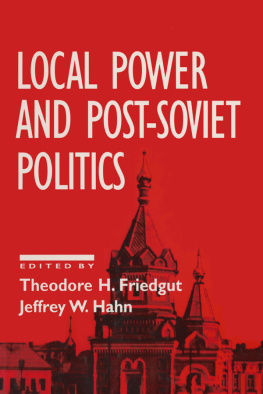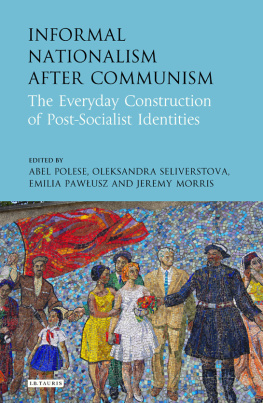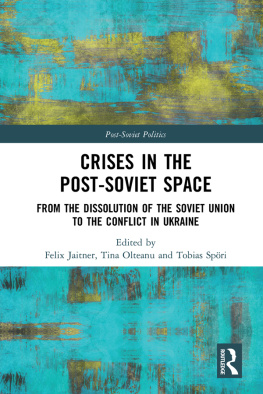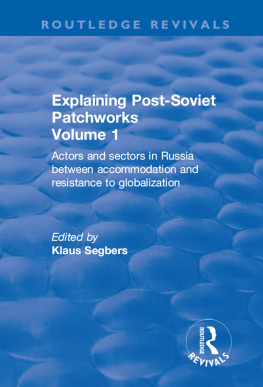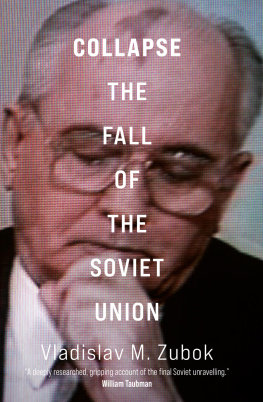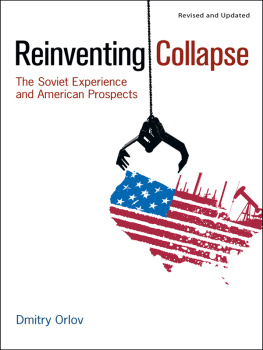Published by the University of Pittsburgh Press, Pittsburgh, Pa., 15260
Copyright 2020, University of Pittsburgh Press
All rights reserved
Manufactured in the United States of America
Printed on acid-free paper
10 9 8 7 6 5 4 3 2 1
Cataloging-in-Publication data is available from the Library of Congress
ISBN 13: 978-0-8229-4617-5
ISBN 10: 0-8229-4617-3
Cover art: Askhat Akhmedyarov, If the Pain Could Be Burnt Away
Cover design: Alex Wolfe
ISBN-13: 978-0-8229-8757-4 (electronic)
PREFACE
Nationalism remains one of the most popular forms of political ideologies worldwide, but it is also the source of constant divisions, inequalities, and power struggles. Inspired by new venues in the study of nationalism, this book discusses the paradoxical fluidity and controlled nature of nation-building processes as well as elitist power struggles to define what the nation is. Often during my interviews aimed at defining nation-building discourses and programs, the first question that politicians and policymakers in power directed at me was What nation do you want to talk about? although we were discussing the same country, its territory, and its sovereignty. How many nations are there in one state? How and where does one start imagining the limits and boundaries of one nation as it overlaps with nationality (also known in some cases as ethnicity), citizenship, communal belonging, and transnational identifications of constant migration flows? The concept and definition of the ever-present nation becomes a complex matter that continues influencing the ways power relations are governed from within the power field of each country and its elites. The book also reflects on who decides which national discourse wins and becomes the dominant discourse guiding politics and social relations in the state.
In essence, this book is about these processes of power relations. It is an attempt to explain how power works through the control of nation and nation-building as a discoursein fact, the most powerful discourse guiding elite competition from within and outside the power field.
My study takes the new states and nations of Eurasia that emerged in 1991 as examples to study nationalizing regimes, although this framework is expandable to other cases and contexts (see fig. 1). The collapse of the Soviet Union famously opened new venues for theories of nationalism and the study of processes and actors involved in these new nation-building processes. To date significant discussions have emerged on the matter of Soviet nationalities policy, the codification of ethnicity and citizenship, and the conceptualization of nationalist discourses and the ways these came about during and after the Soviet Union. And plenty of space and demand remain for conceptualizations of key elements such as state, elites, ethnicity, and nation-building as a contested and in-flux process that directly influences the rights and freedoms of citizens, and democratization processes on the political and social levels. This is the conceptual and empirical gap I address in this study from a variety of different stancesfrom the position of the power elites themselves, from the dissection of the hegemonic nationalist discourse and counterdiscourses that surround it, from the voices of the minorities caught between these power struggles, as well as from anxieties associated with regime change.
The selection of Kazakhs and Latvians as case studies was very important for illustrating examples in which the Russian-speaking minority almost outnumbered indigenous titular ethnic groups of Kazakhs and Latvians before and after independence in 1991. In more electorally democratic Latvia, where the consolidation of pro-Latvian elites had pursued and developed very exclusivist citizenship and nation-building policies, the regime failed to comply with the demands of its Russian-speaking minority even on matters of minority education and state language provisions. In less democratic Kazakhstan the Russian minority was treated differently. Since the declaration of independence in 1991, universal citizenship, the duality of state (Kazakh) and official (Russian) languages, and minority language schools in which Russophone education dominated were promoted and became the fundamental elements of the multicultural policy of President Nursultan Nazarbayevs regime.
What explains this difference in approaches to nation-building after the collapse of the Soviet Union? What can a study of two very different trajectories of development tell us about the nature of power, state, and nationalizing regimes of the new states of Eurasia? I use the concept of nationalizing regime to study these processes of elitist nation-building projects, intra-elite competitions, and legitimacy building for ideological regimes (Latvia) or personalized regimes (Kazakhstan). I believe that the study of power mechanisms through an understanding of political decision making at the highest level can tell us more about what governs these very different processes of nation-building, where specific elitist interests lie, and how these processes affect society, polity, and democracy.
, The Archaeology of Nationalizing Regimes: Narratives, Elites, and Minorities, is a slightly revised version of an article previously published in Problems of Post-Communism 64, no. 6: 34255. I want to thank the editorial board of Problems of Post-Communism, Taylor and Francis, and the editor, Dmitry Gorenburg for allowing its reproduction here.
ACKNOWLEDGMENTS
Writing this book was a long journey with unexpected turns and pleasant surprises, all done in the company of great people and mentors to whom I am indebted. I want to thank David Lane, my supervisor in the Department of Sociology at the University of Cambridge for his careful guidance and encouragement throughout my MPhil and doctoral years in the department. The days on deadlines that I spent in different Latvian libraries and spaces writing up chapters to send him still bring back good memories of tireless fieldwork days. His supervision taught me to be meticulous, focused, and always interested in finding new horizons. My sociology faculty adviser Jeffrey Thomas Miley helped me greatly during our methodological and conceptual discussions on nationalism. I thank him for pointing out so many political sociology texts along with the discussions that followed and firsthand experiences. My committee members, Sally N. Cummings and Hazem Kandil offered significant help, advice, and inspiration throughout this period. They were always attentive regarding the development of my work and I am deeply grateful to them for the support and guidance they gave me at every step of my professional development.
Prajakti Kalra and Siddharth Saxena, the heart of the Cambridge Central Asia Forum and the GCRF-COMPASS team at the University of Cambridge very much helped me to finalize this manuscript and take important steps in further conceptualizations of power, the field I am most passionate about. I am grateful to them for their support and guidance throughout, which involved close readings of numerous chapters, long chats in Cambridge, and talks in the field.
I want to thank Douglas Northrop, the editor of the Central Eurasia in Context series, Peter Kracht, and the whole editorial team at the University of Pittsburgh Press for their advice, close reading, and generous assistance during the completion of this project. I also want to thank all three anonymous peer reviewers for their detailed reading of an earlier draft of the manuscript and for valuable comments that shaped the final version.


